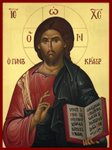While I was in Meridian, I gave a talk titled Prepare the Way of the Lord; Make Straight His Paths (See here). You can download or listen to the talk in its entirety at www.friendsofmikelee.org. The slides I used are available there for download in .pdf format, also. The thesis of this talk was that Jesus came to turn values, ethics, and human existence upside-down. In other words, he did not come to preach a loftier ethic than the Old Law or to liberate us from "religion". He came to call us to a new life (John 10:10) that is so radical that is requires us not only to think differently (the Greek μετανοειτε - metanoeo that is typically rendered "repent" is better rendered "to think differently" from Mark 1:15 - "The time is fulfilled, and the kingdom of God is at hand; repent, and believe in the gospel.") but to have a different being - one that is indwelt by the Holy Spirit through the Sacramental character of Baptism and Confirmation (cf. Catechism of the Catholic Church (CCC) # 1121). In other words, what Jesus calls us to, as the model of our holiness (cf. CCC # 459), demands a completely new existence whereby we receive internal and external helps from God himself. One only has to read the Sermon on the Mount in Matthew 5-7 to see what this new existence entails. It reaches its pinnacle in the Cross. There, Jesus shows us what it means to be the most human. We, because of our love of God and through obedience, give our life through suffering (which is primarily the emptying of self of self: desires, opinions, and the desire to be independent of God) for the sake of the other - even so far as to give it for our enemy as Jesus did (Matthew 5:43-48; Luke 6:27-36; John 15:13; Romans 5:6-11). This giving of self must always be in accord with the Father's will. Jesus had an appointed hour. We must always carefully discern what God is calling us to. The giving of self in sacrifice to God is more than we can ever do unaided. We need the Holy Spirit to do the work in us.
With that preface, I want to return to the notion of thinking differently. Prior to the Fall, man was as he should be: his passions were under the control of his will, his will under the control of his intellect, and his intellect perfectly submitted to God. This is the way God intended man to be when he created him in his image and likeness. After the Fall, man was turned "upside-down" in his nature. Thus, the passions ruled man as they overpowered his weakened will and darkened intellect. Furthermore, man withdrew his submission to God in a vain attempt to be independent of him. Man's passions drove him to seek pleasure, comfort, revenge, and advantage. These sinful inclinations became a normal part of everyday human desires and considered "good". The Decalogue was given to contradict these worldly notions with the truth about our human nature, and how we are to relate to one another because of the dignity of that nature. Jesus came, not to destroy, but to fulfill the Old Law. Romano Guardini relates the disparity between our inclinations and the New Covenant well:
“Healthy common sense says that wealth is blessing; blessing the fullness of possessions; blessing, happiness and pleasure and fame. Our natural reaction to the Sermon on the Mount is one of distaste, and it is better to face the distaste and openly try to overcome it, than to unthinkingly accept Jesus’ words as pious platitudes. That is the last thing they are. They come from heaven, but they shake, palpably, the foundations of earth.” – Romano Guardini The Lord
The Revelation on the Sermon on the Mount does indeed shake the foundations of the earth. We must be very careful with our "healthy common sense". It can quickly lead us to oppose God in a way that puts us in eternal danger. Case in point: the High Priest Caiphas. He was charged with leading Israel's spiritual life. Along comes this enigma in the person of Jesus Christ, but rather that being open to the work of God, Caiphas could only see his own interests and "what-made-sense-to-him". His hardness of heart formulated in "what-we've-always-done"-type attitude brought him to this terrible place:
When he had said this, he cried with a loud voice, "Laz'arus, come out."
The dead man came out, his hands and feet bound with bandages, and his face wrapped with a cloth. Jesus said to them, "Unbind him, and let him go." Many of the Jews therefore, who had come with Mary and had seen what he did, believed in him; but some of them went to the Pharisees and told them what Jesus had done. So the chief priests and the Pharisees gathered the council, and said, "What are we to do? For this man performs many signs. If we let him go on thus, every one will believe in him, and the Romans will come and destroy both our holy place and our nation." But one of them, Ca'iaphas, who was high priest that year, said to them, "You know nothing at all; you do not understand that it is expedient for you that one man should die for the people, and that the whole nation should not perish." He did not say this of his own accord, but being high priest that year he prophesied that Jesus should die for the nation, and not for the nation only, but to gather into one the children of God who are scattered abroad. So from that day on they took counsel how to put him to death. John 11:43-53
Caiphas has the miracles of the Messiah that the Old Testament reveals put right in front of his face. So much so that they were concerned that "everyone would believe in him" if they didn't so something. Why can't they see? Why can't they perceive that since the miracles of the Messiah are performed by Jesus that he is the Messiah?? Yet, rather than rejoice at the presence of God's Messiah, they plot to kill him. They can't think differently!! They cannot bring themselves to see because it might cost them their position, their comfort, and their pride, and it would certainly cause them to reconsider who the Messiah is (not the political figure that was expected). This isn't just simple ignorance. This is a willed ignorance that refuses to see because of the demands of seeing. Their pride and selfishness blinded them.
My question is this: How often are we exactly like Caiphas? How often do we willfully turn away from Jesus because his message demands too much from us? We want pleasure! We want wealth! We want power! We want ease and comfort! We certainly don't want what God demands of us - that "losing oneself is the way to life" (Ratzinger). That just doesn't make sense to us. So we reject the only Way (Jesus said, "I am the Way, the Truth, and the Life - John 14:6) to that which we seek. We, like Caiphas, are willing to commit grave evil to the point of killing the Son of God - the Messenger/Revealer of the Father to protect our interests!! All of this hides under the masquerade of "common sense". We live with one foot in the world and one in the Kingdom. We want the benefits of God like peace, prosperity, eternal life, joy, and wholeness, but we want to retain our own independence: living for pleasure and wealth and ease. How can we expect to live like that when the Son of God, who came for our salvation, consummated his life on the Cross?? He showed us the Royal Road. It leads to Golgotha; to the Cross; to victory in defeat; to life through death.
We must make a choice. Will we choose the Son of God and live? (of course, that involves ALL of the demands of love, but also the promise of eternal beatitude if we follow him), or will we choose our self and our selfish ways desperately trying to be independent of God knowing that that our true independence is impossible?
We must imitate the Blessed Mother who "kept all these things in her heart" (Luke 2:51b). She didn't reject any of the amazing and demanding things that God sent her way. They were confusing, and great, and scary, and exciting, and went against common sense. However, she had already given her allegiance and obedience to the Father in perfect trust. Thus, this trust and faith carried her through her lack of understanding to God's perfect will for her. We must approach God with the faith and trust that allows us to think differently so that we might embrace God's will for us that always brings abundant life (John 10:10). Risk the fact that what God has said is true; that we will actually be "blessed" if we love, serve, and sacrifice.
It is here in this upside-down world of God's love that we discover who we are. We discover that we are children of the Father who desires that we spend eternity inserted, united, and partaking of his divine life. We come to taste and share in that life now to the extent that we live upside-down today...
 Fr. Thomas Dubay, who wrote The Fire Within and Prayer Primer: Igniting the Fire Within,among others, has presented a podcast on contemplation on EWTN. They only leave these special podcasts up for a month and you don't want to miss this one!!!
Fr. Thomas Dubay, who wrote The Fire Within and Prayer Primer: Igniting the Fire Within,among others, has presented a podcast on contemplation on EWTN. They only leave these special podcasts up for a month and you don't want to miss this one!!!





















